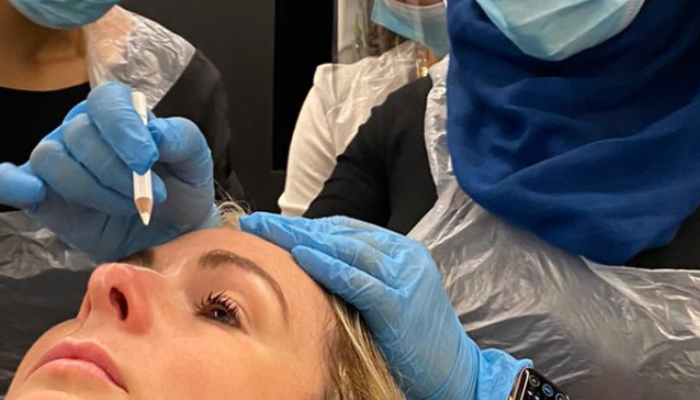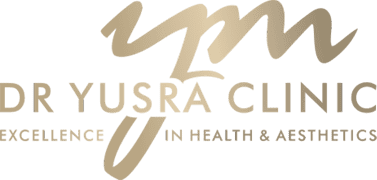Is Non-Surgical Rhinoplasty Safe?
Posted on 27th December 2023 by Dr Yusra Al-Mukhtar

Non-surgical rhinoplasty has become increasingly popular as it is a non-surgical alternative to plastic surgery.
Due to the advancements in cosmetic procedures, options for non-surgical interventions have gained popularity. Non-surgical rhinoplasty, also known as liquid rhinoplasty, involves injecting fillers to reshape and redefine the nose without going under the knife.
While the idea of a quick and minimally invasive solution is appealing, the safety of non-surgical rhinoplasty is a topic that causes debate and concerns.
Let’s explore the complexities of non-surgical rhinoplasty, separating fact from fiction to provide you with a comprehensive understanding of its safety. For more information, read on!
Understanding Non-Surgical Rhinoplasty
Non-surgical rhinoplasty uses dermal fillers, typically hyaluronic acid-based, into specific areas of the nose to address concerns such as a dorsal hump, unevenness, or drooping.
Unlike traditional rhinoplasty, which requires surgery, anaesthesia, and a considerable recovery period, the non-surgical alternative is performed as an outpatient procedure, often dubbed the “lunchtime nose job” due to its quick nature.
The Safety Concerns of Non-surgical Rhinoplasty
While non-surgical rhinoplasty is generally considered safe, it is not entirely risk-free. As with any medical procedure, there are potential risks and side effects.
These can include bruising, swelling, and, in rare cases, vascular complications that may lead to skin necrosis. It is crucial to consult with a qualified and experienced practitioner who can assess your suitability for the procedure and manage any potential risks effectively.
The results of non-surgical rhinoplasty are temporary. Hyaluronic acid fillers, commonly used in these procedures, gradually break down over time.
The duration of the results varies from person to person but typically lasts from six months to two years. Those seeking a permanent change may need to consider surgical rhinoplasty.
Not everyone is an ideal candidate for non-surgical rhinoplasty. Individuals with certain medical conditions, allergies to fillers, or unrealistic expectations may not be suitable candidates.
A thorough consultation with a qualified practitioner is essential to determine whether this treatment is suited to you and to discuss realistic expectations.
Choosing a Qualified Practitioner
Ensuring the safety of non-surgical rhinoplasty starts with selecting a qualified and experienced practitioner.
Before undergoing any cosmetic procedure, take the time to research and choose a medical professional with a proven track record in aesthetic medicine. Look for credentials, reviews, and before-and-after photos to figure out their expertise and the quality of their work.
During the consultation, be transparent about your medical history, expectations, and concerns. A reputable practitioner will conduct a thorough assessment, discuss potential risks, and provide realistic expectations for the results.
Post-Procedure Care and Monitoring
After the procedure, following post-care instructions is crucial for a safe and successful outcome. This may include avoiding certain activities, applying ice to reduce swelling, and refraining from touching or massaging the treated area.
Regular follow-up appointments allow the practitioner to monitor your progress and address any concerns promptly.
What Should You Be Aware Of With Non-Surgical Rhinoplasty?
Non-surgical rhinoplasty is generally considered safe when performed by a qualified and experienced medical professional. However, there are still some considerations and potential risks to be aware of, such as temporary risks, complications and more.
Non-surgical rhinoplasty provides temporary results, typically lasting 6 months to 2 years, depending on the type of filler used. This means that if you’re looking for a permanent change, surgical rhinoplasty may be a more suitable option.
Although uncommon, complications can occur, such as infection, bruising, swelling, and asymmetry. It’s crucial to choose a skilled and experienced injector to minimise the risk of these complications.
Another uncommon complication is allergic reactions to dermal fillers. Ensure that your injector is aware of any allergies you may have and discuss the ingredients in the fillers being used.
There is a small risk of vascular compromise, which can occur if the filler is injected into a blood vessel. This can lead to tissue damage or, in severe cases, necrosis (death of tissue). A knowledgeable injector can minimise this risk.
The expertise of the injector performing the procedure is crucial. Make sure to choose a qualified and experienced medical professional to perform the non-surgical rhinoplasty.
Always schedule a consultation with a qualified professional before undergoing any cosmetic procedure to discuss your goals, assess your suitability for the procedure, and address any concerns you may have.
Keep in mind that individual responses to treatments can vary, and what works well for one person may not be suitable for another.
Is Non-Surgical Rhinoplasty Right For You?
This procedure is a great option if you are looking for a non-invasive way to change the shape of your nose. Determining whether non-surgical rhinoplasty is right for you depends on a range of factors. Here are some considerations to help you decide.
Consider whether you’re comfortable with temporary results. If you’re looking for a permanent change, surgical rhinoplasty might be a better choice.
Moreover, discuss your medical history with a qualified medical professional. Some health conditions or allergies may affect your suitability for the procedure or influence the choice of dermal fillers.
If you have concerns about surgical procedures, anaesthesia, or a longer recovery time, non-surgical rhinoplasty could be a more appealing option. It typically involves minimal downtime and less risk compared to surgical procedures.
Non-surgical rhinoplasty is suitable for addressing specific cosmetic concerns, such as minor asymmetry or bumps. However, if you have major structural issues or functional problems with your nose, surgical rhinoplasty may be more appropriate.
Finally, this treatment is often more cost-effective than surgical procedures, and it usually requires less time for both the procedure and recovery.
Schedule a consultation with qualified and experienced injectors, such as board-certified plastic surgeons or dermatologists. They can assess your anatomy, discuss your goals, and provide personalised recommendations based on your situation.
It’s essential to have realistic expectations about the outcomes and understand the limitations of non-surgical rhinoplasty.
If you are unsure or have specific concerns, consult with a medical professional who can guide you through the decision-making process and provide personalised advice based on your needs and preferences.
Non-Surgical Rhinoplasty at Dr Yusra
Non-surgical rhinoplasty can be a safe and effective option for those seeking subtle enhancements to their nose without the commitment of surgery.
However, it is essential to approach the procedure with a realistic understanding of its limitations and potential risks.
Choosing a qualified practitioner, understanding the temporary nature of the results, and following post-care instructions are key factors in ensuring the safety and success of non-surgical rhinoplasty.
By debunking myths and embracing the truth, individuals can make informed decisions about cosmetic procedures that align with their desires and prioritise their safety.
Here at Dr Yusra, we offer a range of aesthetic treatments, including non-surgical rhinoplasty. We are a doctor-led clinic with a unique approach to health and aesthetics.
We have become one of the most sought-after clinics in both Liverpool and London. If you are after an established clinic that offers non-surgical rhinoplasty, then we at Dr Yusra can help. For more information, contact us today at 0333 224 4666.

